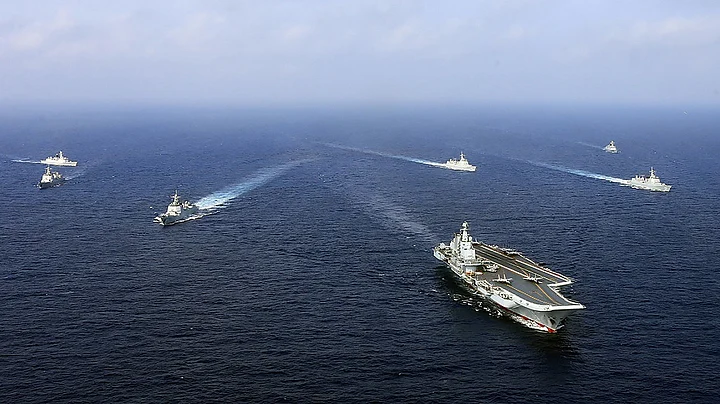India could not have hoped for a better outcome in Taiwan's presidential election. The Democratic Progressive Party’s (DPP) third successive term, after the victory of the current Vice-President Lai Ching-te, ensures a policy continuity that India could utilise to strengthen the recently growing ties.
India's relationship with Taiwan has been a complex narrative of cautious engagement and strategic ambiguity. Nevertheless, the India-Taiwan partnership has immense potential. This article explores the trajectory of their relations and argues for a reevaluation of India's policy towards Taiwan, suggesting a more consistent and strategic approach.
A Cold History
The foundation of India-Taiwan relations is rooted in historical caution. Jawaharlal Nehru, despite his personal rapport with the Chiang family, did not endorse the Kuomintang-led Republic of China (RoC) in its early years.
Nehru's stance was shaped by his perception of the Kuomintang's deviation from Sun Yat-sen's principles and their growing disconnect with the masses, leading to their ouster from Mainland China. Additionally, Nehru's commitment to non-alignment conflicted with Chiang Kai-shek's anti-communist crusade.
India was among the first non-communist countries to recognise the People's Republic of China (PRC) in 1950, swiftly endorsing the One-China policy and supporting the PRC's claim to the United Nations Security Council (UNSC) seat held by Taiwan until 1971.
Despite the RoC's claim that the 1962 Sino-Indian war was a manifestation of international communist aggression, its territorial claims over Indian lands rooted in a rejection of the McMahon Line caused negotiations to falter.
Only after Taiwan's democratisation in the 1990s were these claims finally relinquished. Still, in the shadows of diplomatic discretion, India and Taiwan found common ground in supporting the Tibetan cause, hinting at a shared perspective on certain regional issues.
Young but Promising Relations
Despite the absence of formal diplomatic ties, the establishment of trade offices in 1995, specifically the India-Taipei Association (ITA) and the Taipei Economic Cultural Center (TECC), laid the groundwork for diplomatic functions. Bilateral trade has witnessed a commendable rise, growing from US $1.19 billion in 2001 to US $8.45 billion in 2022. Several Memorandums of Understanding have been signed to bolster collaboration across various sectors, steadily enhancing investment and economic cooperation.
The synergy between India's Look/Act East policy and Taiwan's New Southbound Policy hints at the foundation for a potential strategic partnership. Though primarily focused on economic and people-to-people relations, the history of the evolution of India's Look East policy suggests that these pillars form a robust platform for deepening ties.
However, India's engagement with Taiwan has been marked by inconsistency. On one hand, India has refrained from reiterating its commitment to the One-China policy, opting for a 'well-known and consistent' stance. The virtual attendance of President Tsai Ing-wen's swearing-in by Indian MPs Meenakshi Lekhi and Rahul Kaswan in 2020 indicated a warming of relations.
Yet, when pressures mount, India has shown a tendency to retreat, as seen in the cessation of parliamentary delegation visits to Taiwan after the Doklam standoff in 2017. Additionally, India’s silence amid the other Quad members' criticism of China's military exercises around Taiwan suggests a cautious approach. This inconsistency underscores the need to reassess India's Taiwan policy, establishing pillars for its stability.
India’s Taiwan Policy: The 3 Ts
Trade and Technology: While bilateral trade has seen growth, the full potential remains untapped. Taiwan has increased its institutional presence in India, with offices now in Chennai and Mumbai, in addition to the Taipei Economic and Cultural Center (TECC) in New Delhi. An India-Taiwan Free Trade Agreement, particularly with the prospect of a semiconductor manufacturing facility in India, would be pivotal.
India’s pro-Taiwan trade policy also weaves in perfectly with the emergence of the ‘Fab 4’ chip alliance of Japan, South Korea, the United States, and Taiwan. As India transitions to green energy, technology transfer from Taiwan can prove revolutionary. The two countries have already been collaborating in space technology.
Further, strengthening India-Taiwan ties also aligns with India's plans to build resilient supply chains in the Indo-Pacific. Taiwan has also encouraged its businesses to consider relocating production from China to India, signaling a shift in economic strategies and a recognition of India's growing market.
Threat Perception/Management: China looms large as a potential spoiler for India-Taiwan relations. While there is a temptation to play the 'Taiwan card' against China, episodic politicisation is not a sustainable strategy. Building substantial interdependence is key to giving the relationship real weight and credibility. A strong India-Taiwan partnership could serve as a litmus test for the actual potency of the Chinese threat and offer a collective stance against coercive tactics.
Transnationalism: The Indian diaspora in Taiwan, though small, has established a vibrant community since the 1970s. Their strong socio-economic standing can be a conduit for expressing transnational ties, which New Delhi should institutionalise to fortify connections. Additionally, with Taiwan facing a workforce shortage, there is a demand for more skilled workers from India, presenting an opportunity to strengthen ties through human capital.
As India navigates its geopolitical strategy, a recalibration of its Taiwan policy is due. A consistent and pragmatic approach, devoid of a myopic China prism, can unlock new avenues for collaboration, particularly in trade, technology, and people-to-people exchanges.
The continuity of a DPP presidency, from President Tsai Ing-wen to President-elect Lai Ching-te, therefore represents a golden opportunity. The evolving global order calls for India to assert its strategic autonomy by forging meaningful partnerships with nations like Taiwan. By doing so, India can not only contribute to regional stability but also reinforce its position as a major player in the Indo-Pacific theatre.
[Chetan Rana is a doctoral candidate (Diplomacy and Disarmament) at Jawaharlal Nehru University and an Associate Editor at 9DASHLINE. This is an opinion piece and the views expressed above are the author’s own. The Quint neither endorses nor is responsible for them.]
